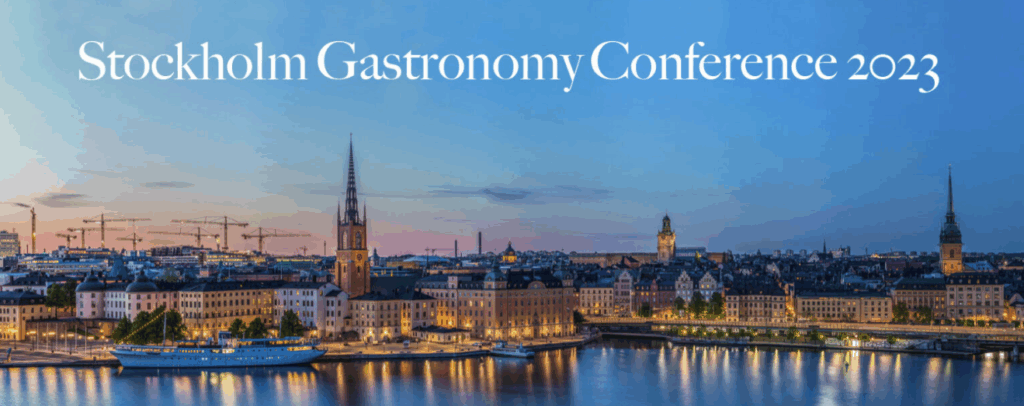In 2022, four Swedish Academies – organized along the food chain – decided to work closely together to promote Gastronomy as a positive driving force for necessary changes in national as well as international food systems. This was done through a distinct consumer perspective on food, meals and gastronomy – “from table to farm” – with a focus on positive taste experiences and delightful meals.
The result of the collaboration was the creation of three programs that were launched during 2022:
- Sweden’s New County Meals4 – a “gastronomic mobilization and positioning” of all 26 cultural regions in Sweden through the development of a three-course dinner including the creation of a table with all accessories. In all more than 500 persons were involved in the creation of the meals and as of today served to an estimated 7,000 guests in Sweden and abroad.
- Stockholm – European Capital of Gastronomy 20235 – a joint effort by the academies and the city of Stockholm to promote the city as an innovative gastronomic destination “worth visiting” in Europe. Around 100 actors contributed with gastronomic content showcasing over 200 food and drink events all through 2023.
- The Tore Wretman Symposium 20226 a research and policy conferences designed to strengthen gastronomy as a multidisciplinary science-area. The conference which was hosted by Stockholm University, attracted 100 participants to 12 tracks and 74 presentations.
Launching the Stockholm Gastronomy Conference
Based on the positive outcome of the Tore Wretman Symposium in 2022, the four Academies – supported by the A.I.G. and the European Community of New Gastronomy decided to move forward with an international multidisciplinary research and policy conference in Gastronomy in 2023, to be hosted by Stockholm University. The overall theme of the conference was “gastronomy research and policy studies – the state of the art”, signaling an ambition to sum-up contemporary research and emerging policy issues in the comprehensive area of gastronomy. The ambition was also to create a solid foundation for collaboration in areas of strategic importance, to be discussed in future international multidisciplinary gastronomy conferences.
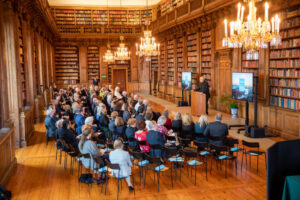
The Planning continued and an updated version of the plans for the conference were presented to the 300 guests at the opening banquet for Stockholm Capital of Gastronomy in Stockholm City Hall, January 13th, 2023. During the banquet, Fabien Petitcolas, President of the A.I.G., gave an inspiring statement where he strongly advocated for a new proactive role of gastronomy in the future. As an example he used David Cameron´s fateful decision to commit to the Brexit referendum while eating a lukewarm pizza at a fast-food restaurant in the Chicago airport, and ended his speech with the rhetorical question – “Had he eaten better, would the present of Europe be any different?”
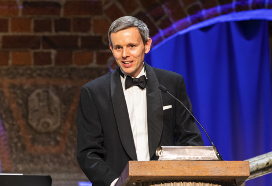
Call for Research and Policy Tracks
Gastronomy as a research area is split up in many disciplinary subareas. As one of the purposes of the Stockholm Gastronomy Conference was to strengthen gastronomy as a comprehensive research area “in its own right”, it was decided to formulate a “call for tracks” directed at the research community at large, rather than attempting to identify possible track themes. The call for tracks was thus opened to researchers from all science-areas and academic disciplines, as well as to policy and decisionmakers from different sectors of the multifaceted gastronomic value chain.
The outcome of the call was 27 track-proposals, covering natural, social and medical sciences as well as medicine, technology and humanities! The proposals were later screened and evaluated by the Honorary Advisory Board that was created to scientifically support the academic part of the conference8.
Track Structure and call for Abstracts
The evaluation of the tracks eventually resulted in the selection of 24 tracks9. These tracks were then divided into four main themes – each containing 6 tracks. The labels of the different tracks are listed in the end of this paper:
- Taste, pleasure and delight as levers for sustainable food consumption. The tracks in this theme dealt with “taste, delight and enjoyment” of food meals and gastronomy as positive levers for sustainable, safe, and healthy food consumption. One track discussed for example the differences in perceived value of “what is eaten” is (e.g. on the menu) in culinary – or in neutral of nutritional terms. Other tracks adresssed the importance of taste experiences from a sensory perspective, as well as the health and climatic impact of “tasty food” in public meals.
- Gastronomy according to terroir, place, space and culture addressed the role of place in the form of terroir, space and culture to shape unique food and meal traditions. Here, the tracks and sessions deal, among other things, with how places (cities, regions, etc.) may develop into gastronomic destinations, and other tracks dealing with dietary cultural heritage, and others looking into restaurants as spaces for local cultural production.
- Gastronomy – a powerful force of transformation gathered researchers and policy makers sharing an interest in how gastronomy in different forms can be used in the social, economic, and environmental development of society. The track “Eat Drink and Pray” addresses the role of gastronomy in different religions, and another track presents new research on the role of food in revitalizing the environment and transforming the food system.
D. Gastronomy – norms, skills, competencies and education focused on the development of norms, skills, competences in the field of gastronomy. One of the areas addressed in some of the track’s deals with chefs as managers and leaders, another addressed hospitality as an important element in the restaurant and hospitality industry.
Attendance, Abstracts and Presentations
In all 246 persons from 23 different countries around the world were registered at the conference. Out of the 183 abstracts submitted to the conference, 156 were accepted for presentation by the track organizers, while another 30 presentations (mainly in the policy area) were accepted without formal abstracts. In al 186 oral presentations were made during the conference. The presentations took place in 5-6 parallel 1.5-hour sessions, with an average of three 30-minute presentations in each session.
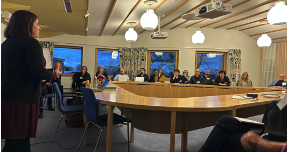
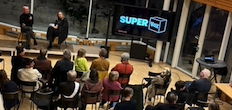
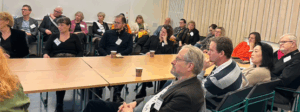
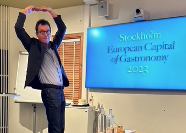
Photos taken during the presentations of the different themes.
Each track organizing team was responsible for managing their own track, including structuring the presentations and assigning chairpersons to each session. As can be seen above, some track-organizers took a very active part in materializing their message!
Embodying Gastronomy as a Science Area – through Meals!
An important element in the Stockholm Gastronomy Conference was the real-life materialization of Gastronomy through all the meals – from dinners to coffee-breaks – served during the conference. All meals were inspired by the different dishes produced in the program Sweden’s New County Dishes, and during lunches and dinners the origin of the different dishes from all over Sweden were orally presented by chefs – in some cases the chefs that had themselves created the dishes.
Towards the International Gastronomy Conference in Madrid 2024
Upon a request from A.I.G. directed to its national member academies in 2023, the Real Academia de Gastronomía in Spain (RAG) declared its interest arranging an international science and policy conference like the one in Stockholm in 2024. This interest was confirmed during the Swedish Gastronomy Award ceremony 2024, organized by the Swedish Academy of Gastronomy at the royal castle in Stockholm. During this ceremony the European Capital of Gastronomy appointment was also transferred from Stockholm to Madrid.
The 24 Tracks at Stockholm Gastronomy Conference
A.1 : Pleasure as the Ally of Healthier Eating
A.2: Beyond Gastronomy – Sensory Challenges and Opportunities for Meals of Tomorrow
A.3: From waste to taste using sensory and consumer science methodologies
A.4: Consuming food: Consumer culture theories as a lens in food studies
A.5: Sustainable, tasty public meals as a lever for food system transformation
A.6: Food and Well-being
B.1: The importance of food experiences for sustainable place making and destination
B.2: Gastronomic Heritage – Dietary and Cultural perspectives
B.3: Sweden’s New County Meals – a National Gastronomic Mobilization
B.4: Restaurants as Spaces for Cultural Production
B.5: Local food systems -when and how the producer interacts with the customer
B.6: A lot can happen over coffee and tea: Swedish Fika, British Afternoon Tea, Japanese Tea Ceremony, Turkish Coffee & Tea Ceremonies, and more
C.1: Culinary Curating – Art as/and/in food vice versa
C.2: Food Supply Security – from a Consumer Perspective
C.3: Eat, drink and Pray: Study of Religions Perspectives on Religion and Meals
C.4: Gastronomy and Social Life
C.5: Gastronomic landscape and biosphere stewardship: Food as a tangible entry point for revitalizing landscapes and equitable food system transformations
C.6: Gastronomy and territorial development: gastro-diplomacy and national/regional branding
D.1: The role and leadership of the Chef in European fine dining restaurants
D.2: Advancing Science to unlock the tacit knowledge of chefs and home cooks -Northern Lights on Food revisited
D.3: Gastronomy’s most important companion – the hosting skills. The contribution of the hospitable meeting and service to gastronomic experiences
D.4: Beverages in Culinary Arts and Hospitality: Norms and new Normalities
D.5: Advancing the future of higher culinary education
D.6: Challenges and opportunities for European Master level education in Gastronomy: Towards pan-European initiatives?

